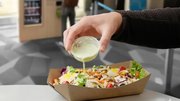Article
Foodservice companies, grocers work together to fulfill labor, worker needs
As consumers stock up on groceries to follow shelter-in-place orders, restaurants are laying off workers as retailers face a shortage.

May 6, 2020 by Elliot Maras — Editor, Kiosk Marketplace & Vending Times
As consumers stock up on groceries and avoid dining out to follow shelter-in-place orders, commercial foodservice establishments are laying off workers as retailers face shortages.
Sodexo, for example, one of the nation's largest foodservice contractors, announced it was laying off 708 employees last month at the University of Pittsburgh due to restricted dining hours caused by the COVID-19 outbreak. Albertsons Companies, meanwhile, witnessed a 34% sales gain for the first eight weeks of fiscal 2020 compared to 2019 and is hiring 30,000 temporary associates.
The dual scenarios have been playing out nationwide as consumers stock up on groceries at supermarkets and eat fewer meals via away-from-home foodservice establishments.
Two-thirds of the nation's restaurant employees — 8 million people — have lost their jobs since the start of the COVID-19 outbreak, according to the National Restaurant Association.
So while foodservice operators have been forced to lay off and furlough employees, retailers are looking to expand their workforces to meet a rising customer demand.
C.J. Recher, vice president of marketing at Five Star Food Service Inc., a Chattanooga, Tennessee-based convenience services operation serving the Southeast, has a bird's-eye view of the parallel workforce dynamic. Many of his accounts have ceased or curtailed operations, but many of the meat-processing plants and retail distribution centers in his market have increased their activity since the start of the COVID-19 outbreak
"They're shopping us more than they did in the past," Recher told this website regarding retail distribution centers and meat processors. "They're using the (onsite) markets or the vending machines more than they have in the past, because they can't go out to a fast-food restaurant for lunch."
Reachout initiatives begin
Companies on both sides of this new labor landscape have sought to correct the imbalance by providing temporary employment to foodservice employees at supermarkets, grocery wholesalers or grocery product manufacturers.
Most of the outreach has come from companies seeking to find help — the retailers and foodservice manufacturers.
Albertsons has reached out to foodservice and hospitality chains in search of qualified employees looking for work: BJ's Restaurants, Inspire Brands, Hilton, Marriott, MGM Resorts, ASM Global, G6 Hospitality and Regal Cinemas.
"So many businesses in the hospitality and retail sectors are scaling back hours or temporarily closing as their customers remain home and adhere to shelter-in-place orders," Vivek Sankaran, president and CEO of Albertsons Companies, said in a prepared statement. "We are grateful to be a resource to help fill a critical need in our own business and take care of people who want to continue working during this time of national emergency."
Kroger announced a similar partnership with Sysco, a national foodservice distributor, offering 30 or more days of employment to furloughed Sysco employees.
"This agreement will benefit many of Sysco's associates by creating good work opportunities with a respected company, while at the same time helping to alleviate strain in the food supply chain due to a surge in demand at retail stores," Kevin Hourican, president and chief executive officer of Sysco, said in a prepared statement.
A global scenario
Similar scenarios are playing out overseas.
McDonald's in Germany formed a labor partnership with Aldi, one of that country's largest supermarket chains. "They (laid off McDonald's employees) will be hired on a temporary basis at the usual Aldi conditions and can return to McDonald's after the assignment," the two companies said a joint press release.
McDonald's in Canada formed similar partnerships with Walmart, Sobeys and Loblaws, Morgan O'Marra, McDonald's communications manager, told this website.
Grocery wholesalers partner with foodservice counterparts
The labor imbalance has played out among supermarket and foodservice wholesalers as well.
C&S Wholesale Grocers, Inc., one of the nation's largest wholesale grocery supply companies, began partnering with foodservice distributors after attending a call organized by the White House in the grocery, retail and foodservice industries to discuss the impacts of the coronavirus pandemic on supply chains, Mike Duffy, CEO of C&S Wholesale Foods, told this website in early April.
Duffy said he sought to alleviate a worker shortage stemming from increased food retail demands while transferring foodservice personnel to similar job functions where demand is lacking in the foodservice industry.
C&S Wholesale partnered with US Foods, which distributes to around 300,000 foodservice operators, as well as Performance Food Group, another foodservice distributor and the parent company of Vistar, the nation's largest wholesaler to the convenience services industry.
"This is one of the many ways that PFG can utilize our people and assets to support our local communities as we all weather this period of disruption," George Holm PFG chairman, president and CEO, said in a prepared statement.
Food processors respond to grocery demand
Foodservice manufacturers that supply supermarkets have naturally benefitted from the demand and have sought to expand their workforces.
"We are hiring where needed to maintain our normal staffing levels at all of our locations," Morgan Watchous, communications manager at Tyson Foods, told this website in early April. The company has shifted more than 50 million pounds of food from foodservice to retail, moving some of its core product lines, including lunch meat, hot dogs, bacon, corn dogs and more.
"Our supply chain has stepped up to meet the demand of our retail partners and our consumers thus far," Kelsey Roemhildt, corporate communications manager at General Mills Inc., told this website. "We haven't had any major disruptions to date, and we're running at full capacity across nearly all our platforms to service demand. All categories have seen an increase in demand, with the most significant uptick in categories like cereal, soup, flour, baking mixes, and mac and cheese."
Mondelez International recently hired 1,000 employees to ensure uninterrupted functioning of its distribution network to meet rising retail demand, Jessica Vogl, global media relations manager said in an email exchange.
"We're seeing additional marketplace demand for our product and people are shifting to purchasing more shelf-stable food and choosing to eat at home rather than spending money out of home," Vogl said. "With that additional demand, we're needing to hire some additional colleagues to help us meet that."
"We are hiring employees for sales merchandiser roles as well as temp roles in our plants in locations across the U.S.," Vogl said.
Mondelez's partnerships have expanded beyond foodservice and hospitality sectors. In addition to Hilton Hotels & Resorts, Mondelez has reached out to Avis Car Rental, Modell's Sporting Goods, and employment specialists such as Accenture and North Suburban Cook County America's Job Center.
Foodservice operators adapt
Some foodservice operators have been able to prevent layoffs by finding opportunities with companies in expanding areas, such as food delivery.
Walk-On's, based in Baton Rouge, Louisiana, has found close to 30 alternative employment opportunities, said Scott Taylor, president and chief operating officer. Taylor and his team found positions for their employees at food delivery companies such as Uber Eats and Watir.
"We just reached out to partners we had, asking if they have a need," Taylor said.
Asian, a Cincinnati based chain specializing in Asian American fare, leveraged its own fleet of eight vehicles, which had mainly been used for catering to handle some of the deliveries for food delivery companies — Postmates, Uber Eats, DoorDash and Skip Card — as well as other restaurants, said Stephan Harman, co-founder.
"It really is a win-win-win for everybody," Harman said. "The amount of people eating meals is unchanged."
About Elliot Maras
Elliot Maras is the editor of Kiosk Marketplace and Vending Times. He brings three decades covering unattended retail and commercial foodservice.







